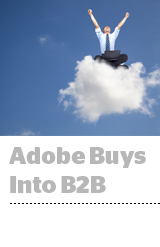
Adobe said Thursday it has agreed to acquire the B2B marketing platform Marketo for $4.75 billion.
It’s the biggest deal in Adobe’s history. And the cloud technology giant may be shelling out so much because Marketo’s B2B category strength could help as Adobe moves into media buying and ecommerce, à la TubeMogul and Magento, where the distinction between marketing silos has faded.
“The combination of Marketo with Adobe Advertising, Analytics, Commerce and Marketing clouds places Adobe at the heart of all marketing,” said Adobe executive VP Brad Rencher on an investor call Thursday afternoon.
Marketo shares Adobe’s vision of a conglomerated (and lucrative) marketing technology landscape.
“We want to be a one-stop destination,” according to Mika Yamamoto, who became Marketo’s global president in August and spoke with AdExchanger prior to reports of a pending sale last week. “To do that, we need to make sure we have integrated experiences with all the other players in the marketing tech stack.”
Adobe has had similar capabilities to Marketo products for some time, like with its 2013 acquisition of email marketing company Neolane, now Adobe Campaign. But Marketo lets Adobe tie its existing suite to upper-funnel activity like prospecting leads and to eventual business-based conversions.
“Every B2B customer does email and does analytics. For us, the opportunity is to connect more closely to core revenue flows of a business,” Rencher said, citing Marketo’s attribution capability.
The acquisition is also a bullish sign for the private equity companies that have snapped up public marketing technology companies. Vista Equity Partners bought Marketo for $1.8 billion in late 2016. Golden Gate Capital acquired Neustar at $2.9 billion, Vector Capital privatized Sizmek and Rocket Fuel and last month the B2B data and advertising company Dun & Bradstreet agreed to be taken private by CC Capital for $6.9 billion.
But Adobe paid almost triple Marketo’s public market value in less than two years. This high premium makes sense considering that Adobe is a near nonentity in the B2B category compared to Oracle, Salesforce and Marketo, said Todd Berkowitz, Gartner’s managing VP focused on B2B technology.
So Adobe’s only real avenue into B2B was to buy, and Marketo was the last significant piece of B2B real estate up for sale.
Adobe could have filled the same product capabilities with more efficient, smaller-scale deals, said Joe Stanhope, a Forrester VP and principal analyst. “There’s clearly a premium on Marketo being the last big, broadly-known option in the category.”
Investors seemed skeptical of the price tag.
“Two years ago, you could have acquired [Marketo] for about a third. What do you think about the move-to-market boost compared to the premium you’re paying?” asked one investor.
“Is there anything [Marketo] has done in the past two years to change how we thought about them when they were public?” asked another, alluding to Wall Street’s lukewarm attachment to Marketo at the time.
“I can’t comment on what it was two years ago,” said Adobe CEO Shantanu Narayen. “But from my perspective it’s a market-leading product.”
This post was syndicated from Ad Exchanger.


More Stories
The One Show AI judge Sherina Florence releases hip-hop album for deadline push
Week of Feb. 17 Cable News Ratings: Fox News and CNN Make Primetime Gains
AppLovin is Officially the New Target of Short Sellers